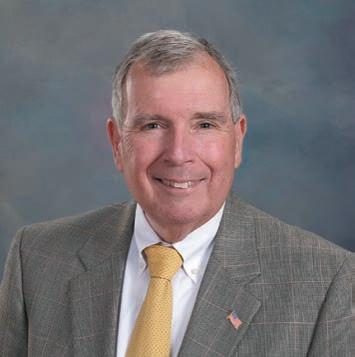
2 minute read
Home Care Workforce Impacts Georgians
Dave Lamb
Workforce, workforce, workforce… it is a theme facing healthcare providers across Georgia and the nation. Providers have been encountering a growing workforce issue for several years, an issue that has been dramatically enhanced by the stresses of the pandemic.
The Georgia General Assembly held joint appropriations hearings January 18-20, 2022, with an agency theme of Workforce Shortages Throughout All of State Government. Last November, the House Human Relations and Aging Committee held hearings on the healthcare workforce shortage, hearing the concerns of a wide range of providers seeking nurses and caregivers. For healthcare, the workforce shortage is complex, involving pressures both within and outside the industry. We are all indebted to the effort of our healthcare workforce who has been serving the needs of Georgians during the pandemic.
Now, we must all work to stabilize that workforce into the future.
The pandemic changed the delivery of patient care, ushering in a new appreciation for the patient’s house as more Georgians opted to remain in their residences to receive more of their care. While the home does not replace the need for facility care, it does augment total patient care and contentment.
An October 2021 Kaiser Family Foundation study examined the care delivered in the home and community, finding that five percent (5%) of the adult population is receiving paid care by caregivers and nurses in their homes. In our state, that translates to more than 400,000 Georgians who are receiving care in their homes.
The Georgia Chapter of the Home Care Association of America (HCAOA) represents many of the more than 2,000 licensed home care provers across the state who provide a wide range of skilled and unskilled care. In a survey conducted in October 2021 concerning the home care workforce, eighty percent (80%) of the providers surveyed had insufficient applicants to meet their hiring needs while more than sixty percent (60%) could not meet the pay rate needs of the applicant.
Caregivers represent the largest segment of the home care workforce. During the first eighteen (18) months of the pandemic, the Georgia CNA Registry lost over twelve percent (12.7%) of listed CNAs. While this overall drop is concerning, more troubling is the loss of CNAs in nine years in 112 Georgia counties.
All Georgians deserve CNA coverage; many counties have a critical need. Echols County in south Georgia had only three (3) CNAs on the registry in November 2021. While some may discount Echols as a small county, we cannot and will not discount those in Echols County that need care. The caregiver role is critical for the unskilled care needs of Georgians.
Unfortunately, the competition for caregivers is often with non-medical opportunities outside of caregiving. These opportunities come at your local Wal-Mart, Hobby Lobby, or nearby Amazon warehouse, and come in the $15 - 20 per hour pay range, a level current healthcare reimbursement rates prevent providers from matching.
Caregivers are critical to the healthcare continuum and the overall care of Georgians. We need reimbursement rate support, but we also need assistance building a true caregiver career path in Georgia that addresses all aspects of the caregiver role and recognizes the caregiver heart Georgians see every day.
Dave Lamb is the Director of Governmental Affairs for CareMaster Medical Services. He also serves as the Legislative Chair for the Georgia Chapter of the Home Care Association of America (HCAOA.) He can be reached at davelamb@caremastermedical.com.


